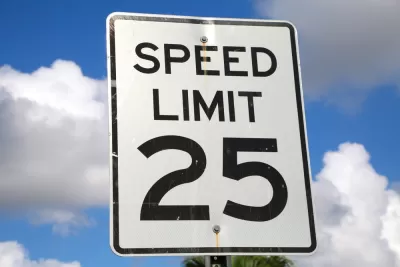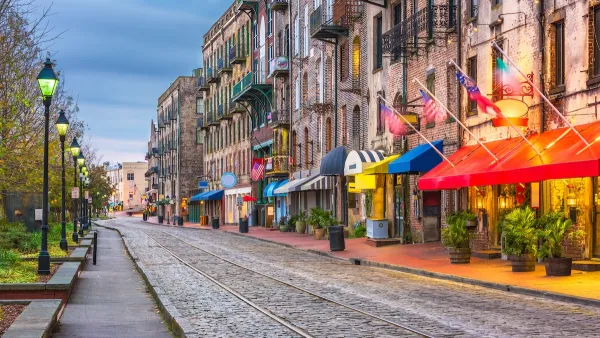A new law would allow cities to lower speed limits without going through an onerous state approval process.

A new Oregon law could let cities set their own speed limits on some roads, bypassing the long and often unsuccessful process by which cities have had to apply for lower speed limits until now.
Kea Wilson of Streetsblog reports on the proposed law, which would allow cities to more quickly adjust speed limits on dangerous roads and respond to community concerns. The law would not apply to interstate freeways or state-controlled roads, and would require cities to prove they can provide meaningful recommendations for new speeds.
A parallel proposal would improve safety on state-controlled roads by changing the calculation for speed limits, which, in most U.S. cities, is dictated by the “85th percentile rule,” setting the speed limit at the average speed that 85 percent of drivers travel. “Now, many Oregon roads will be subject to a significantly safer 50th percentile rule, wherein the slowest half of drivers on the road will set the standard,” along with road conditions and adjacent businesses and developments.
According to Wilson, Portland is already engaged in an effort to reduce speed limits on many of its roads. “As part of a separate effort, the city already won the right to slow to 20 miles per hour in 2018, and it’s continuing to redesign its roads to reinforce those limits as fast as possible.”
FULL STORY: Most Cities Can’t Set Their Own Speed Limits — But Maybe They Should

Maui's Vacation Rental Debate Turns Ugly
Verbal attacks, misinformation campaigns and fistfights plague a high-stakes debate to convert thousands of vacation rentals into long-term housing.

Planetizen Federal Action Tracker
A weekly monitor of how Trump’s orders and actions are impacting planners and planning in America.

San Francisco Suspends Traffic Calming Amidst Record Deaths
Citing “a challenging fiscal landscape,” the city will cease the program on the heels of 42 traffic deaths, including 24 pedestrians.

Adaptive Reuse Will Create Housing in a Suburban Texas Strip Mall
A developer is reimagining a strip mall property as a mixed-use complex with housing and retail.

Study: Anti-Homelessness Laws Don’t Work
Research shows that punitive measures that criminalized unhoused people don’t help reduce homelessness.

In U.S., Urban Gondolas Face Uphill Battle
Cities in Latin America and Europe have embraced aerial transitways — AKA gondolas — as sustainable, convenient urban transport, especially in tricky geographies. American cities have yet to catch up.
Urban Design for Planners 1: Software Tools
This six-course series explores essential urban design concepts using open source software and equips planners with the tools they need to participate fully in the urban design process.
Planning for Universal Design
Learn the tools for implementing Universal Design in planning regulations.
Heyer Gruel & Associates PA
JM Goldson LLC
Custer County Colorado
City of Camden Redevelopment Agency
City of Astoria
Transportation Research & Education Center (TREC) at Portland State University
Jefferson Parish Government
Camden Redevelopment Agency
City of Claremont





























